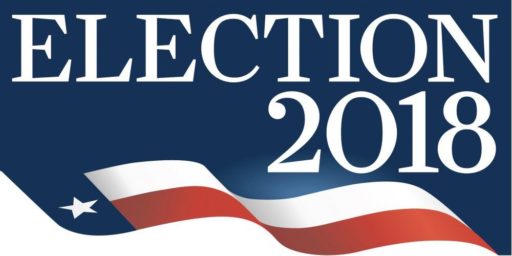Anatomy of a Meme: How the P.J. Crowley Quote Went Viral
Philippa Thomas has a fascinating take on how she broke the news of (now former) State Department P.J. Crowley's condemnation of the Obama administration's treatment of Bradley Manning.
Philippa Thomas has a fascinating take on how she broke the news of (now former) State Department P.J. Crowley’s condemnation of the Obama administration’s treatment of Bradley Manning.
The essentials are these:
- She’s a veteran BBC journalist, currently on sabbatical at Harvard.
- She attended the small event at which Crowley made the remarks.
- She clarified with him afterwards that he intended the remarks to be on-the-record, and he said, “Sure.”
- She tweeted the quote and then wrote it up on her personal blog
- Everyone from Mark Mardell to Glenn Greenwald posted, Tweeted, Reddited, and otherwise promoted the quote.
Her conclusion:
Would the story have taken longer to emerge if I were not a longstanding BBC News correspondent? Probably, although others present confirmed the details. The outlets that were swiftest to respond – like the Guardian – had no trouble linking to the blogpost because they knew who I was.
This could be characterised as a perfect “new media” storm. But it’s also true to say that a professional journalist for a well-established news outlet like the BBC has a voice that can emerge more clearly from the white noise of the blogosphere.
I don’t know who was in attendance at the small gathering. I suspect any of them could have gotten this to go viral with the right effort. Thomas is right: Her reputation for integrity–and her connections to the likes of Mardell and other decisionmakers at prestige media outlets–hastened the spread. But anyone with an established social media following could have done the same, if perhaps it would have taken ever-so-slightly longer to catch on.
Thomas was right, too, to verify that Crowley was on-the-record. Yes, he was a professional media spokesman. But sometimes the rules aren’t clear in these informal venues.
I’ve seen some speculation, which strikes me as plausible, that Crowley knew exactly what he was doing and understood that the statement would cost him his job. Apparently, there were pretty strong tensions at State and he was happy to move on.





It is almost beyond belief that a professional spokesman, at such a high level, would make a statement like that in public without full conscious appreciation of the consequences.
It is absolutely beyond belief that he would, afterwords, agree to have the statement be on the record, were he not intent on seeing those consequences through.
You really haven’t been following Crowley then, for very long.
The rule is that everything is on the record unless clearly stated otherwise (and agreed by all parties). If the rules aren’t clear, then that means it’s on the record.
A journalist’s job is to pass information on to their readers and viewers. Why would you try to withhold things from your audience?
The kind of thinking Joyner displays here is a big problem and is part of the reason people have less and less faith in journalism today.
@TG Chicago: Huh? Nowhere so I see James condemning or even criticizing Thomas’ report. He’s simply stating the facts here, and adding the supposition that Crowley knew what he was doing at the time. What kind of aberrant thinking is this demonstrating?
@John Burgess: I think you’re missing the point. The debate is about whether it was appropriate for Thomas to ask whether Crowley’s comment was on the record before reporting it. You are correct that James was not criticizing Thomas. That’s the problem; he should have been.
When Crowley made the comment it should have been considered on the record unless Crowley and everyone else present had previously agreed that the discussion was off the record. For Thomas to give Crowley a chance to take it back shows that she is only willing to make public what officials want to be made public. That’s not reporting; it’s PR.
@TG Chicago:
Thomas answers that critique in detail:
I’ve been at several of these sort of events and, generally, the ground rules are stated at the outset. Sometimes, the whole thing is on or off the record. Sometimes, the prepared remarks are on the record but Q&A is off. Sometimes, it’s under Chatham House Rules, which allows summaries but no attribution. But Thomas was new to these Harvard salons and wanted to make sure not to violate a trust.
Second, as she notes, just because comments are OTR doesn’t mean they’re not useful.
Third, as she alludes, the greater good is in maintaining access to the powerful. Burning a source for a one-time gotcha–which can easily be walked back–is just not smart journalism. Thomas has been in the business for two decades and, presumably wants to continue to be trusted by officials to be treated fairly.
Which, of course, privileges the powerful over the powerless. What happened to comforting the afflicted and afflicting the comfortable? This sounds like comforting the comfortable.
And the powerless are empowered by having all information shut off at the source?
My entire career included speaking to a variety of journalists. Some followed the rules and got more comprehensive information, whether or not they could directly quote it. Others, who didn’t follow the rules, got stonewalled. Trust is a two-way street and a source, no matter the actual job title, isn’t going to put him/herself at risk simply because some journalist has dreams of Pulitzer Prizes in his head.
Were all journalists paragons of virtue–a quality necessary before the ‘afflicted/afflicting’ meme validly kicks in, BTW–there’d be no issue here. The fact is,some journalists are scum-suckers who don’t mind putting their own extrapolations in the mouths of others, to those others’ detriment, not to mention the damage they do to any ‘truth seeking’. Those rules have been around for a good 50 years. They’ve worked pretty well and to the satisfaction of both sources and journalists. That every bit of information isn’t available to every soul is not something I find troublesome in the least.